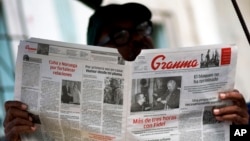The White House said it is “not particularly concerned” about an editorial published in Cuba’s state newspaper warning the United States against meddling in its internal affairs. The editorial comes as President Barack Obama prepares for a historic visit to Havana, March 21-22.
The editorial published on Wednesday in the Communist Party’s official newspaper, Granma, said while Barack Obama will be warmly welcomed, the communist government has no plans to change its political system as the two nations normalize relations after more than 50 years.
The article noted there should be no doubt about the Cuban government’s commitment to its “revolutionary and anti-imperialist ideals.” It also criticized U.S. support for the rights of political dissidents, saying Washington “should abandon the pretense of fabricating an internal political opposition, paid for with money from U.S. taxpayers.”
White House spokesman Josh Earnest said Wednesday the White House is not worried about the opinion piece and reiterated the president's intention of meeting with “political opponents of the Cuban government and standing up for, in a very tangible way, the universal human rights of the Cuban people.”
There are reports the two countries have been at odds about which dissidents Obama will meet. According to reports, Havana is proposing that he meet only with government-approved members of "civil society."
The White House has insisted it solely will determine the list of Cuban citizens, including anti-government activists, with whom the president will visit during the trip.
“This is an opportunity to use the moral influence of the United States to advocate for greater freedoms for the Cuban people,” Earnest said. “That’s something that the United States does around the world and it certainly makes sense that we would be doing that in a country just 90 miles off our shores.”
Since the policy shift, the U.S. has cleared the path for more travel, trade and commerce with Cuba and has urged the Cuban government to make it easier for Cuban citizens to start businesses, engage in trade and access information online.
Too many concessions
The Obama administration approach toward Cuba is sharply opposed by many in the Republican-led Congress and by some Republican presidential hopefuls. Florida Senator Marco Rubio has threatened to reverse the change in U.S.-Cuba relations.
U.S. critics of Obama’s policy to normalize relations argue the U.S. leader gave too many concessions in the policy shift, particularly when it comes rights, such as freedom of association, freedom of speech and the ability to engage in politics.
But “[Obama] is not giving up on human rights in order to normalize relations with Cuba; he is normalizing with relations with Cuba as a way to make progress on human rights,” said William LeoGrande, Cuba expert and American University government professor.
In December 2014, Obama announced the United States would re-establish diplomatic relations with Cuba and begin the process of normalizing relations. The White House has argued that decades of U.S. isolation of Cuba failed to build an open and democratic country and diminished U.S. influence in the Western Hemisphere.




